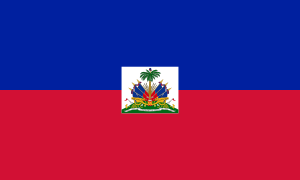Haitian Football Federation
The Haitian Football Federation (FHF) (French: Fédération Haïtienne de Football, Haitian Creole: Federasyon Foutbòl Ayisyen) is the governing body for football in Haiti. The FHF is responsible for overseeing all aspects of the game of football in Haiti, both professional and amateur. A member of CONCACAF since 1961, FHF is in charge of football in Haiti and all lower categories. The principal sporting field is the Sylvio Cator stadium in Port-au-Prince. It is a founding member of the CONCACAF.[3]
| CONCACAF | |
|---|---|
 | |
| Founded | 1904[1] |
| FIFA affiliation | 1934[1] |
| CONCACAF affiliation | 1961[2] |
| President | Yves Jean-Bart |
| Website | www |
Federal Council
| Member | Role | Notes |
|---|---|---|
| Yves Jean-Bart | President | Elected for fifth time in January 2016,[4] and has held its position since the year 2000. |
| Julio Cadet | Vice-President | |
| Carlo Marcelin | General secretary | |
| Frantz Calixte | Treasurer | |
| Wilner Etienne | Technical director |
Staff
- Men's Coach: Marc Collat

- Men's Assistant Coach: Pierre Roland Saint-Jean

- Women's Coach: Shek Borkowski

- Women's Director: Shek Borkowski

- Women's Assistant Coach: Christian Castro

- U20 Coach: Manuel Rodriguez Navarro

- U17 Coach: Chery Pierre

- U17 Coach: Gabriel Michel

- U15 Coach: Julio Cesar Alvarez Perez

- Fitness: Gregorio B. Modesto Gomez

- Academy: Gregorio B. Modesto Gomez

2010 earthquake
The federation, which had struggled financially for years, lost all but two of its more than 30 officials during the 2010 earthquake.[5] Also because of the earthquake, the national stadium's field, as well as many other stadiums, were converted to be used as housing for survivors and refugees in makeshift tents.[5][6] Due to the financial and personal losses of the federation, large financial sums were donated by FIFA and globally–high-ranking individuals within the sport, as well as a $3 million fund for rebuilding infrastructure that had been created by FIFA.[5]
Camp Nous
Camp Nous is the Haitian Football Federation operated training centre and academy for Haitian football players in Croix-des-Bouquets. It was inaugurated in May 2012.[7]
See also
References
- FIFA: Haiti
- "Ramón Coll, electo Presidente de la Confederación de Futbol de América del Norte, América Central y el Caribe". La Nación (Google News Archive). 23 September 1961.
- Hall, Michael R., ed. (2012). "Historical Dictionary of Haiti". p. 240. ISBN 9780810878105. Retrieved 30 March 2016.
- "Yves Jean-Bart Reelected to 4th Term as President of Haitian Soccer". Defend.ht. 30 January 2012. Archived from the original on 11 April 2012. Retrieved 30 May 2016.
- Robinson, Joshua (March 3, 2010), "Haitian soccer's future uncertain", SportsIllustrated.com, Port-au-Prince, Haiti: Time Inc., archived from the original on 2010-03-11, retrieved March 3, 2010
- "Haití duele". Periodismo de fútbol internacional (in Spanish). Blogspot. 18 January 2010. Retrieved March 3, 2010.
- "Inauguration de l'Académie de football «Camp Nous»". Le Matin Haiti. 30 May 2012. Retrieved 17 April 2017.
External links
| Wikimedia Commons has media related to Haiti national football team. |
- Haiti at the FIFA website
- Haiti at CONCACAF website
- Fédération Haïtienne de Football